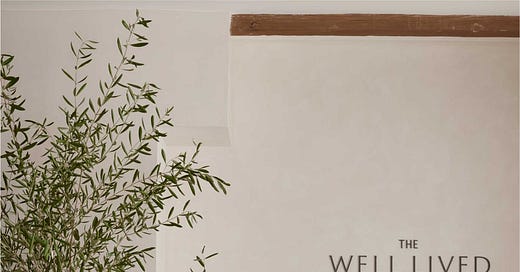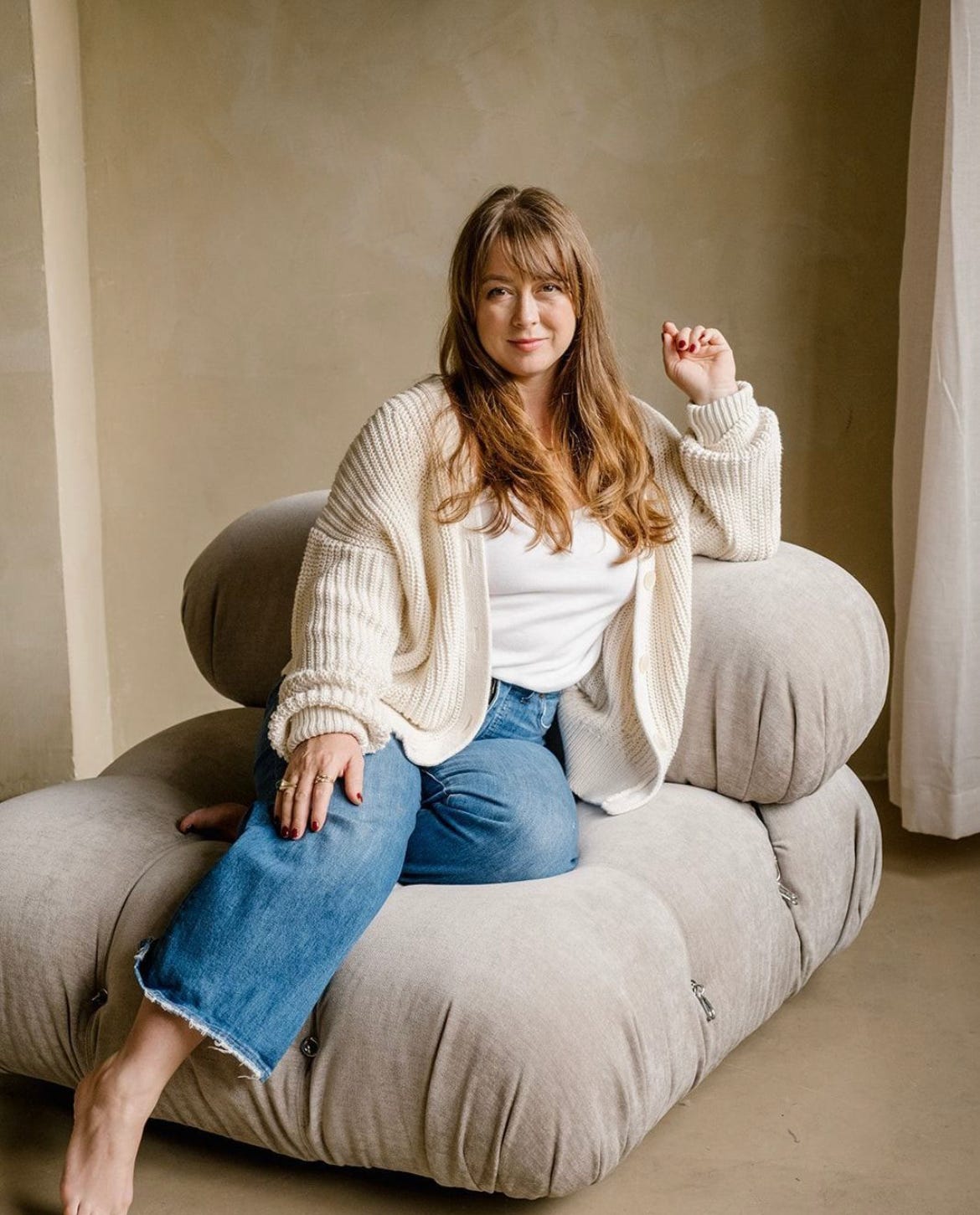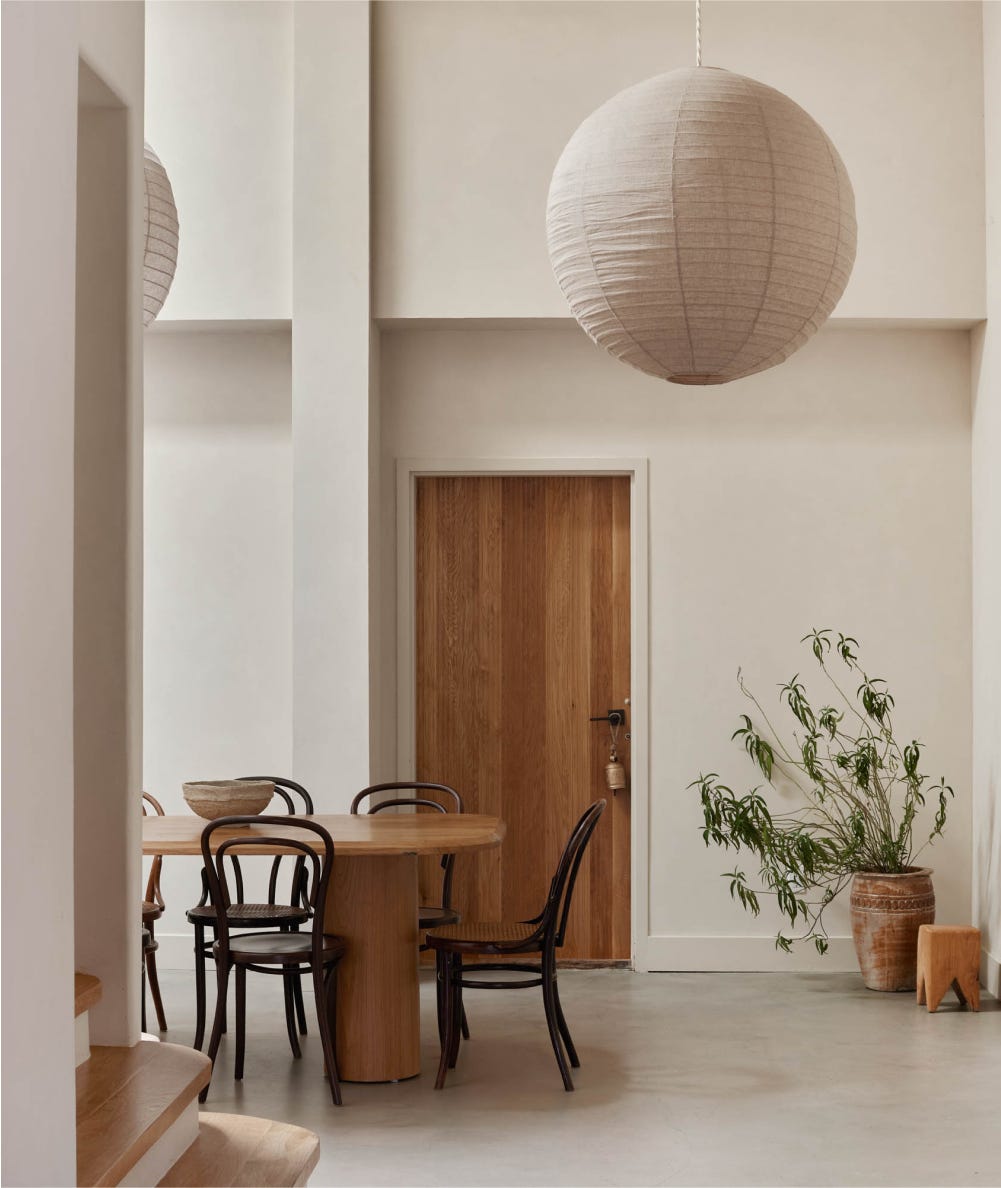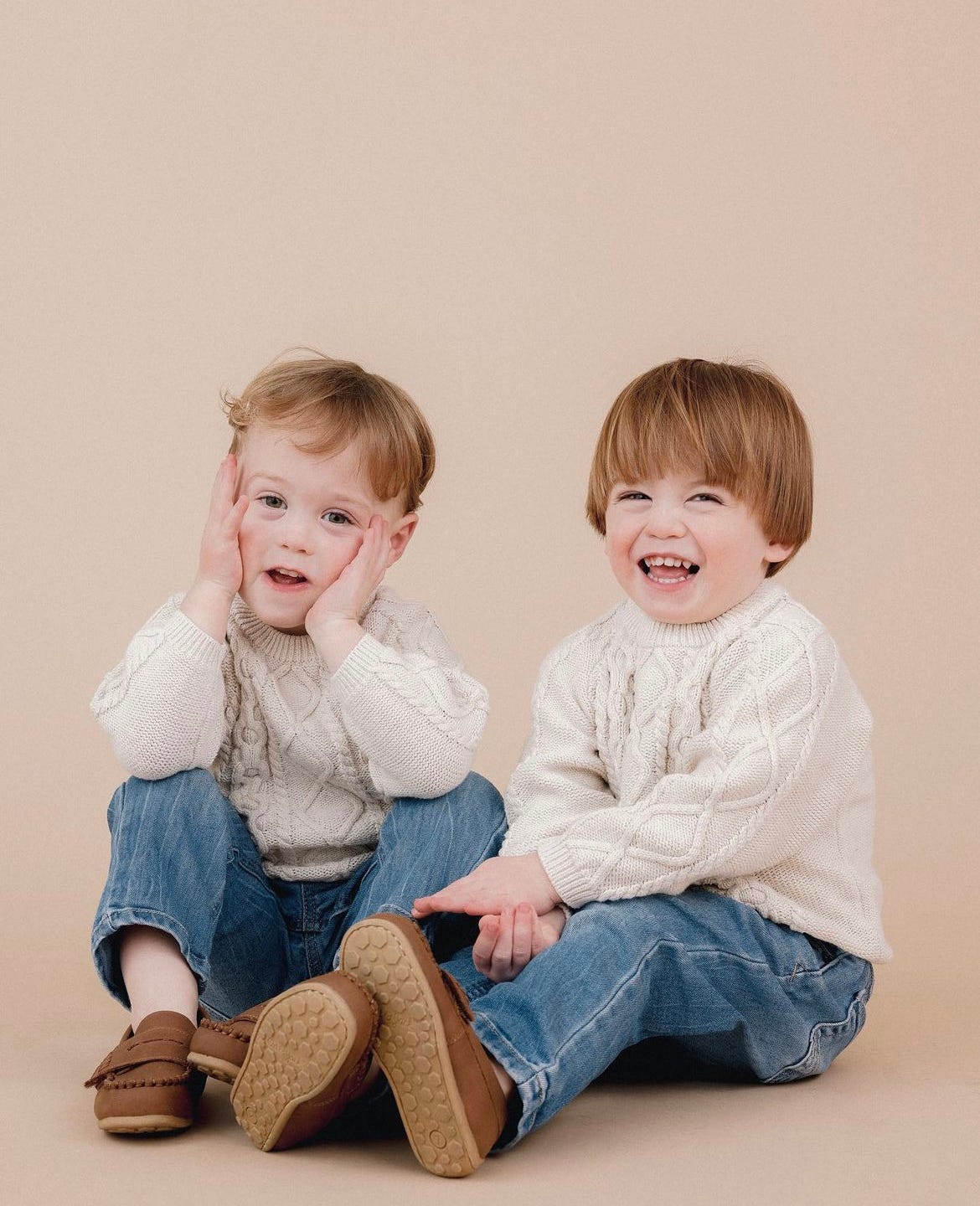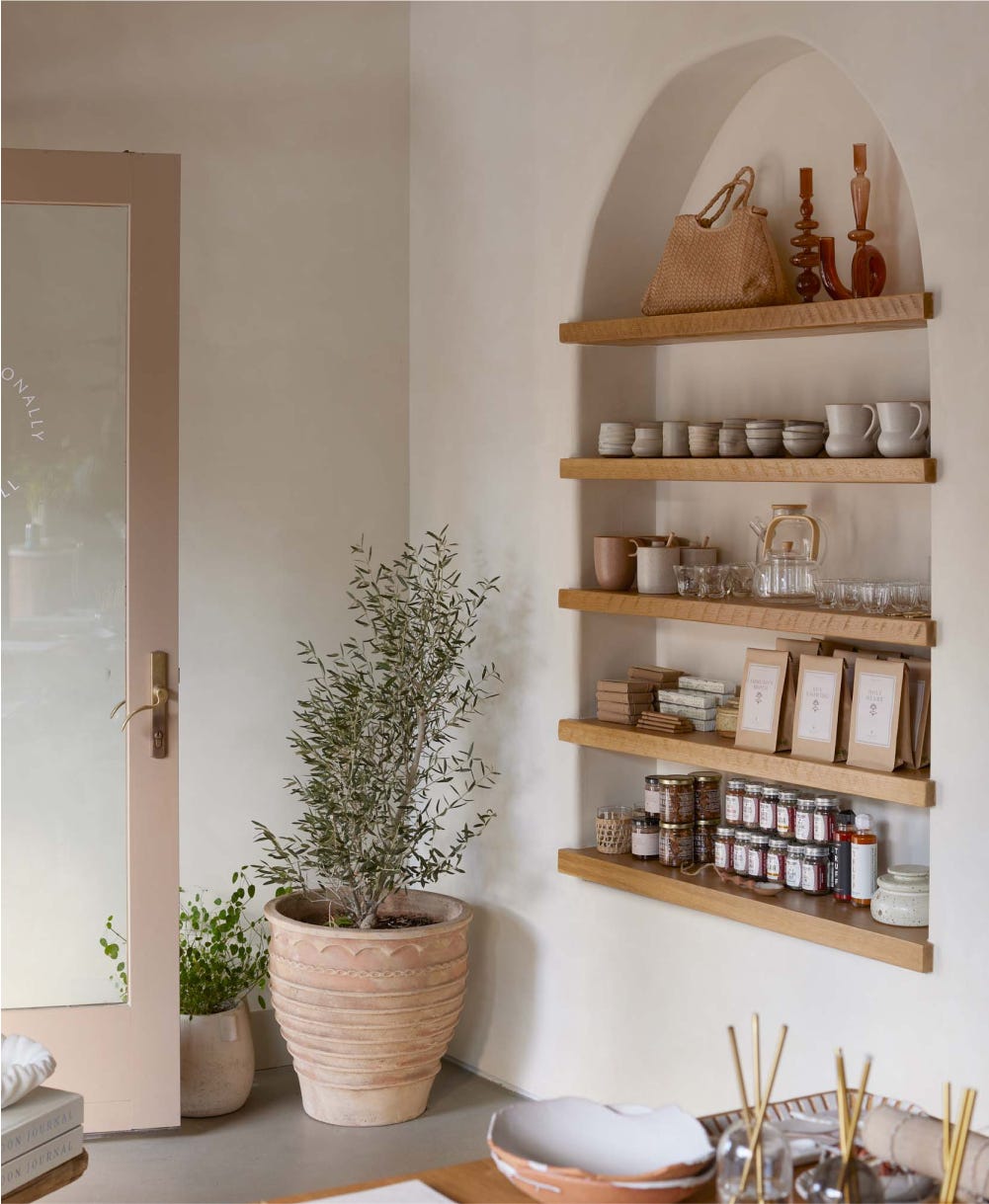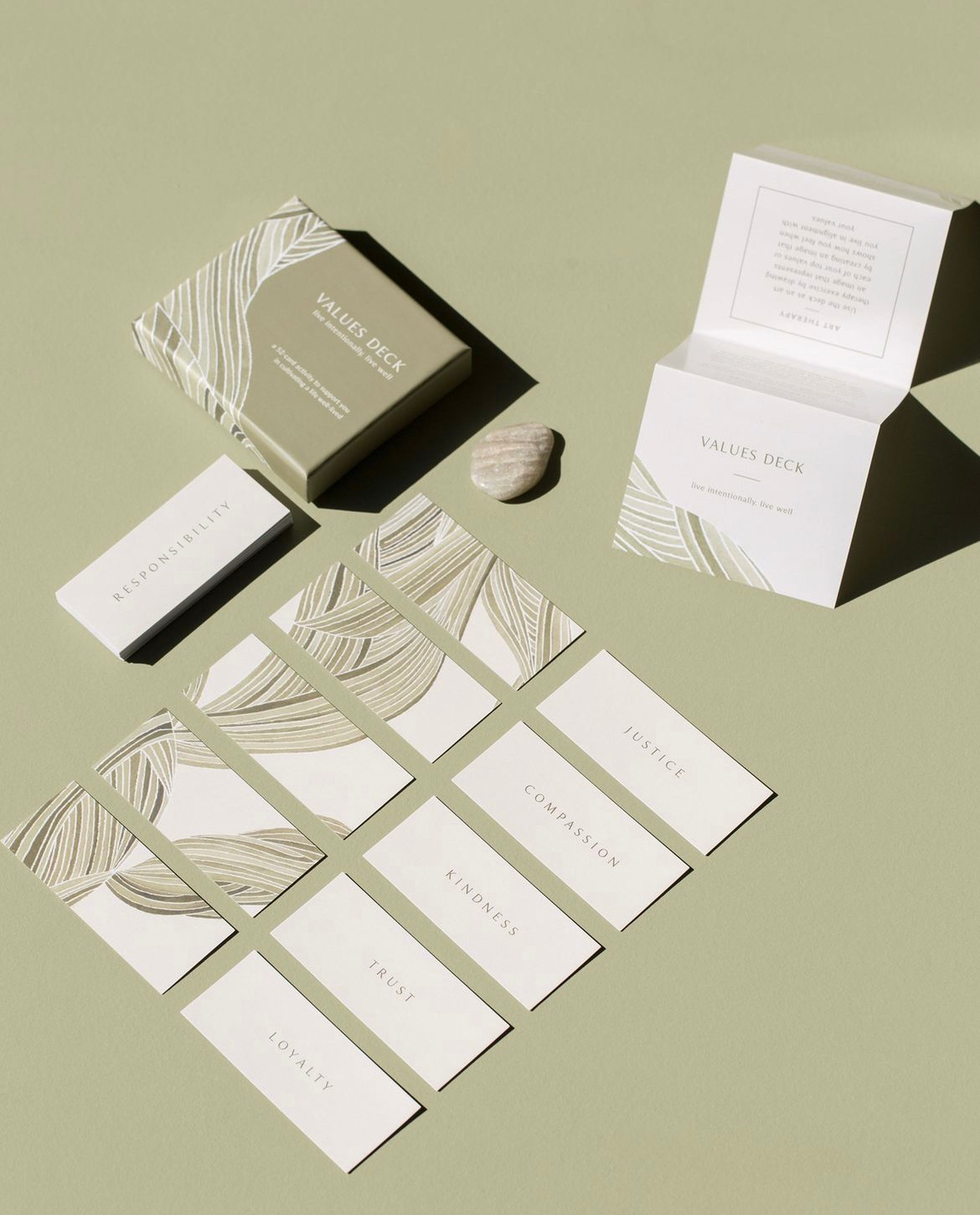When I was thinking about who I wanted to interview this month — someone special in honor of the newsletter’s one year anniversary — I instantly knew it had to be Jaimi. Jaimi Brooks is a psychotherapist, women’s group leader and the founder of The Well Lived Woman.
Her impact in my own life has been huge. As my therapist, she’s provided endless tools and resources for personal growth, lifted me up and supported me through some of my darkest times, and encouraged my creativity. She recognizes the deep human need for meaningful connection, and has created The Well Lived Woman to host events (sound baths, communal circles, workshops) as well as foster relationships outside of therapy (through her storefront, women’s groups, collaborations and much, much more).
Jaimi’s light-filled gathering space was designed by Sarah Sherman Samuel, with a focus on materiality, pattern, texture and patina. Here, we discuss her complex upbringing, the importance of fostering community, the difficulties of motherhood, and of course, the Enneagram.
This newsletter is available free for everyone. I spend many hours a month putting my heart into this space, free of ads or sponsorships. If you’d like to financially support my writing, please consider becoming a paid subscriber. There are different membership options available here (with perks — like 10% off all Duende shop orders!).
Transcribed, edited and briefly condensed from our conversation on August 25, 2023.
Elise: I have so much I want to talk about! Most people experience a therapist in a session for themselves, and it’s not often that we get to ask our own therapist questions. So thank you!
Jaimi: It’ll be fun to see what you want to ask me.
Elise: Obviously you are my therapist, but I’m so grateful to now also consider you a friend, and someone that I really respect and admire. To start, I would love to know more about your childhood and what your upbringing was like.
Jaimi: Really?
Elise: I’ve only heard bits and pieces, but it sounds so fascinating. I’m sure we could spend the whole hour talking about it!
Jaimi: We could spend months talking about it! I’ll start simple and concise, with the bullet points.
My parents were divorced. They divorced when I was two. So I grew up going back and forth between my mom’s house and my dad’s house. The arrangement that we had was that I spent a month with my mom, and a month with my dad, which is wild. Can you imagine changing your house for a month at a time? And then within that, every other weekend I’d go back and forth. And they were wildly different places. The culture at each house was so different.
I was the youngest of three boys at my dad’s house, and I had a stepmom there. I was either the only child or eventually the oldest to my little brother at my mom’s house. My mom was a vivacious, fun-loving hippie and my dad was a neurotic Jew. Very very different experiences.
Elise: Wow, and that was all you really knew, since you were so young when they separated.
Jaimi: Yeah. And my dad was married to my stepmom from the time that I was four, so she played an important part in my childhood and my growing up.
Elise: That’s so much to navigate as a child. You are so gifted at navigating emotions and understanding people. Do you feel like that was your experience while growing up as well, or was getting into therapy more of a reaction to something you maybe missed?
Jaimi: I think my childhood required for me to grow up very quickly — I rapidly came to hone my understanding of people. It was a really hard thing for a child to need to do, but that emotional nuance was a sense of safety, and helped me to successfully navigate my reality. It’s benefitted me in my adult life, and in my work. It’s been the water that I drink and the air that I breathe since forever.
I’ve seen a lot of things, and I’ve understood a lot of things from the get-go. I’ve always spent so much time with adults. My mom was a manicurist and my aunts were all hairdressers, so I spent a lot of time in a beauty salon. I loved it — just listening to all the ladies talk, I was hearing adult conversations all the time. And with my stepmom too, being the only other girl in the house, I was her confidant.
The more I absorbed that, the more adult-like I became. People treated me like an adult rather than a child, which is ridiculous. You know, as I’ve gotten older, I try to bring in more play and fun to invite that balance in later in my life.
Elise: Totally, that makes a lot of sense. It’s amazing that you’ve been able to find ways to incorporate more of that inner child and playfulness as you’ve gotten older. Especially because the former was all you really knew.
Jaimi: Yeah, I think a lot of therapists have a similar story and dynamic.
Elise: Hearing about how you grew up at the beauty salon is so cool — I know you also ended up spending time working in the beauty business yourself. Is that background what piqued your interest? Were you thinking the beauty industry was going to be something you pursued more long-term?
Jaimi: No, I never thought that I would pursue beauty long-term. I knew that I wanted to be a therapist from early on. To be a therapist, you go to school for a long time, and we didn’t have a lot of money. But since I knew the ins and outs of the beauty world so well, it was the most logical way to make good money, and I could do it easily just because I was so familiar with it. And it was so fun!
Elise: Such a contrast to therapy, I’m sure it maybe added a lightness to your life in a way!
Jaimi: Yes, it is a lightness and there can be frivolity in it, but you are also sitting one-on-one with people — seeing them weekly, and there’s a lot of intimacy in that.
Elise: True, I hadn’t thought about it like that. So it was probably very insightful for your therapist training…
Jaimi: It was really really good, and I took a lot of pride in it. I became a manicurist because that’s what my mom did. I really did know how to do that well and I liked the detailedness. In about an hour’s time, you have immediate gratification, and it was fun to be able to master something very specific like that. I was working in Pasadena and had amazing clients who really expanded my world and taught me a lot… I was only 18 years old when I started. Some of my clients were on the Ninth Circuit Court of Appeals, and doing really cool things in the world.
Elise: Wow! I remember you also had some celebrity clients, and have some wild stories from that.
Jaimi: Eventually I did, and that was fun in a different, weird way. Once I transferred out of community college to go to UCLA, I had to give up all my consistent clientele and the ability to work from one place — moving to in-home clients.
I didn’t really understand the landscape of things in LA-proper, cause I was in Pasadena. It’s close in proximity but it’s very different… so the people who opted in to having me visit their homes were all wealthy people and celebrities. It really allowed me to make a bunch of money and go to school, but I definitely didn’t have a normal college experience ever. I was young but I wasn’t doing things that people my age were doing. I was working really hard and had more money than other people my age, but I never went to a college party. I don’t even know what that’s like! And I have no friends from college at all.
Elise: That’s so interesting to me. Is there a particular funny story or thing that comes to mind from that era of your life? I remember a couple but am not sure you want to name names, haha.
Jaimi: Yeah, there are for sure. I mean how many stories are you allowed? The rules of therapy don’t apply to the rules of being a manicurist.
As I was getting married, Reese Witherspoon told me that I was going to die to have to be monogamous. “You’re gonna hate it, it’s gonna be terrible.” Like, why would you tell me that?
Elise: Right before your wedding?! That’s hilarious.
I love learning more about your life — we’ve had a relationship for a couple years now, but hearing all of this is so special and tells me more of a complete story of what makes you you.
Therapy is such a giving profession, how do you take care of yourself or fill your own cup? Do you have any rituals?
Jaimi: It’s not untrue that it is a giving profession, and it requires you to really show up for others. But I do think that there is something about being required to set yourself aside that is replenishing in and of itself. Providing therapy is grounding for me. If I’m overwhelmed and stressed out and feeling frazzled… I get to go and be there for somebody else. Getting to be singularly focused on something outside of myself — on somebody else’s bigger picture — is in itself a type of ritual that helps me to take care of myself. Does that make sense? It’s not completely selfless.
Elise: Absolutely, I love that. Obviously you know me and how feelings, emotions and energy can get the best of me sometimes. I feel like a career in therapy would be a huge struggle for me. You seem to have healthy, built-in boundaries and I think I would feel so depleted and drained hearing about somebody else’s bigger picture all the time. I’m so grateful for people with gifts like you!
Jaimi: Yes, there have been times where I do have less availability for my personal relationships. When I am not replenished, I don’t reply to texts in the time that I should. I choose what is important, and I love my work, but I have my children and my husband and sometimes, that’s all that gets to matter in a day. Sometimes that just has to be enough.
During the Covid pandemic, everyone was in such intense need. Everybody was in crisis, and I was also in crisis. We are all navigating a world that’s changing everyday. I was a terrible friend. I would wake up, be with my kids, work, and then sleep. That was all. I couldn’t have small conversations. I couldn’t make plans, I just couldn’t… there was nothing left, you know?
I’ve been thinking a lot about how important ritual is for us. It’s comforting, grounding and soothing. It really tethers us. It can take a lot of discipline to establish rituals initially, but it feels good for all the different reasons. There are many different kinds of rituals that we can have in our lives to support us.
Elise: Within your personal relationships — friendships, family and loved ones — is it hard to not always put on your therapy hat? When they are going through difficulties, how do you navigate that?
Jaimi: They might get a little free therapy, ha. It’s such a part of me that I don’t think I can section that off completely. But it’s also impossible to be the objective person in their life, which is inherent as a part of therapy. Like I don’t see you, my client, in the day-to-day context of your life. I have an education, an understanding, a perspective that I can offer those closest to me, but there have been times when my husband is like, “can’t you just treat me like one of your clients?” No, I can’t! Can’t you just stop complaining? The closer someone is to you, the less objective you can be. In the same way we can’t really be objective for ourselves.
Elise: Do people take advantage of the fact that you’re a therapist? I don’t even mean with friends, but just out in the world…
Jaimi: I don’t feel that way in my ongoing relationships. But sometimes I get myself into trouble — maybe by asking certain questions that other people don’t often ask. People can tend to go in fast with me and I’m like, wait! I can’t tell an Uber driver that I’m a therapist.
Elise: Haha, that’ll definitely open up a can of worms.
Do you think your approach to therapy has changed or evolved over the years? Is it something that you’re continually refining, or trying new things?
Jaimi: I think I trust myself more, and allow myself my own style more and more. My number one tool in therapy is my own humanness and my own intuition more-so than theory. So much of what they teach you in school is science and theory — which is all important and informs — but at the end of the day, we crave humanness and connection, and people want to know that others see them for their full humanity. It’s really comforting to see another’s genuine humanity.
Elise: Something I feel like doesn’t happen often in your industry…
Jaimi: It doesn’t. They teach you not to allow that of yourself — that you need to protect your clients from it, and they teach you that in a lot of cases you know what’s better for your client than they do. I think my work is to help my clients to understand that they know themselves better, and to teach them to trust in themselves fully, and for me to trust in myself more fully. I can trust myself to be seen, and they can trust themselves to be seen, and that’s not very common.
Elise: That is unfortunate because it’s such a helpful tool — learning how to walk through life trusting ourselves fully and listening to our intuition.
Jaimi: What if everybody just walked around trusting themselves? Dangerous, man!
Elise: Has motherhood shifted your perspective on your work, or your approach at all?
Jaimi: I don’t think it has shifted my ideas or thinking around it. Before I had my boys (I have twins), I was leading motherhood groups, and even without having children then, I was able to help tether women to their womanhood, especially during a time when you feel like you’re floundering or losing your identity. I think it was really helpful — and is still helpful — that I had a strong foothold for myself, both before and after becoming a mom. And yet, it’s still so hard to have your feelings match up with your beliefs. To fervently feel the way that you believe. To feel entitled to what you think is right. It’s really, really hard. My depth of feeling and compassion for how much guilt you feel all the time, how it feels like there’s no way to get it right… that sucks.
Elise: I imagine that is so, so hard.
Jaimi: You can just keep trying to get it right, but like, you’re never going to get it just right. In your own mind, in anybody’s mind. It’s a really terrible conundrum.
Elise: How old are your boys now?
Jaimi: They are four. Another conundrum I realized a couple years into having them is this: When I’m away from them, I’m never fully happy. And when I’m with them, I’m never fully happy. And that is so fucked up.
Elise: I’ve been thinking about that a lot lately as I sort through my own feelings and thoughts on motherhood. What a difficult thing to hold.
Jaimi: Like when I’m with them, I want to be at peace reading a book or taking a nap or just thinking my own thoughts. And then when I’m not with them, I miss them terribly, and want to know what they are getting up to. I don’t want to be missing out! It’s a real Catch-22 and it’s terrible.
Elise: I’m curious if there is a way that you identify yourself now that you wouldn’t have expected when you were younger?
Jaimi: I’ve always wanted to understand the rules, and I want to do it right. Not like I want to follow the rules so that I don’t get in trouble or for winning, but for the purpose of excellence.
Elise: Your Enneagram 1-ness!
Jaimi: Yes, it is. It’s for excellence. Right now I feel much more rebellious and impulsive than I’ve ever felt, which is interesting to me.
Elise: Yeah, maybe that is healthy for you?
Jaimi: Yes, the balance is good. Let’s introduce some new elements and see how it affects us.
Elise: How are you rebelling?
Jaimi: I don’t know if I know. There is a Buddhist teaching that says You have to learn the rules so you know how to break them properly. I feel like that’s where I am. Let’s not follow the ones that are just not working for us anymore — that don’t truly resonate or make sense.
Elise: Let’s mix it up!
Jaimi: And let's do what we feel like!
Elise: I love that, that’s a good reminder for all of us.
You have obviously been such an inspiration and expander for me — especially in this new chapter of life in LA. What keeps you inspired and motivated yourself?
Jaimi: Hmm, I don’t know. I always feel open to new possibility, and as time has gone on, I don’t push things too hard. I allow things to align and arrive, and I follow what feels easy. Before, I would decide what should happen and then force it. Now, it feels like things are happening in the way they want to. So I really look to that for inspiration, and it gets beautiful and magical things done, and suggests things that I don’t think I would have come to on my own.
I think surrounding myself with people who are talented, enthusiastic and passionate about what they’re up to always brings about good ideas and new possibilities. I love learning new things all the time. And reading is my favorite thing. I love reading.
Elise: Are there any good books that you’ve read recently?
Jaimi: Oh, always! Right now I’m reading The Covenant of Water. It’s so good, and I’m also listening to Oprah’s conversation with the author Abraham Verghese. It’s a six-part deep dive into his writing and process of the book. Lately, once I find something that I like, I’m enjoying digging into the process and analysis of it — there’s so much magic and beauty and god in all of it. It’s a miracle that anything ever comes to be. This man is a doctor but has always been gifted with words, and just for him to be able to find the time and talent to put this into a story. It’s a medical story and it’s also a story of humanity.
Elise: That sounds stunning.
Jaimi: It is. It really is.
Elise: I love that advice, too. I’m thinking about something in my own life — I came across Elissa Altman recently. She’s a food writer and author, and I discovered her newsletter on Substack. This post around aging just really moved me, and her big-heartedness is evident in all that she touches. I subscribed right away and ended up doing a more thorough dive, where I found a wonderful podcast conversation she had with Katherine May (another favorite writer of mine). And then I picked up one of her books at the library. When something resonates, dig a little deeper. Go even further. Sit with that goodness longer and take it in from various angles.
Jaimi: Yes! The last thing I did it with was Succession, the show, and I loved looking at it from an attachment theory standpoint and a business standpoint.
Elise: Ohhh yes! Did you listen to the podcasts about it too?
Jaimi: Yeah, I listened to many, many podcasts — from a parenting standpoint to a psychologist standpoint, from Mark Cuban’s thoughts to the show’s creators and writers. I listened to it from all the perspectives.
Even with The Covenant of Water… like how did he decide to do that?! All of these ties, he’s got the mind of a wizard. But he didn’t. He didn’t even make the connections himself — he just let it move through him. It reminds me that there are many different ways to have a process. Sometimes you can white-knuckle it and hold it tightly and plan everything, and other times you arrive at such beauty by holding it loosely and seeing what wants to come through.
Elise: I feel like you just put into words what this year has felt like for me personally.
Jaimi: Well, if I can do either one, I definitely want to do the second one.
Elise: For sure. It’s never fun to white-knuckle your way through something. I know this from experience, haha.
Jaimi: It depends on what you are on the Enneagram. If you’re a 5, white-knuckling might feel good.
Elise: I’d love to talk about your space in Topanga, The Well Lived Woman. I’m such a big fan. You’ve created an intentional, safe and welcoming place (that is visually stunning, too) and I’m curious, was that always the goal? From the outside, it feels like you’ve combined your numerous gifts and interests into a very holistic experience — through workshops, gatherings, product offerings, etcetera. Was that always a part of your plan?
Jaimi: It was not always a part of the plan. It became something I wanted for myself. I started offering therapy, and then I wanted to create weekly women’s groups. I really loved running the groups and they were their own kind of magic, but still felt limited (plus, there are only so many groups that I can run). We were finding connection, sharing resources, and there was still a hunger beyond that.
A lot of the women in these groups have businesses and creative projects — they need a place to shoot photography, a nice location to have a baby shower, or to do a retreat. We never had a place to do it. It used to take place at my house until I had the boys, but it never made sense after that. Once I had kids, I started thinking about brick and mortar, which was a super scary idea. I had been actively looking when Covid hit, but thankfully I couldn’t decide what part of the city to be in, so I was relieved it hadn’t happened before the pandemic. I don’t know why I thought starting a business like The Well Lived Woman with 4-year-old twins was a good idea (it was absolutely insane and not respecting any of my own limits), so I’m glad the world just took care of that for me. I set it aside. I was really confused that I kept thinking about it, like why do I want this so bad? I have my boys… twins are a lot. I have a full practice. I have my groups. Why do I need to do more thing? Can’t it just be enough? I had to sit with that for awhile, but it kept coming back up for me.
Ultimately I wanted it for myself. I like being in community with women. It fills me up to sit in a circle with women. I want to be with women as often as possible, and only more-so now that my house is filled with boys. I want to be in a beautiful place with women. That is a good life for me. And also, starting businesses is creativity for me. Sure, I want it to be successful, I want to make money, that would be really great. But it is a source of creation and vibrancy for me. It connects me to a sense of aliveness. There’s something about being an entrepreneur that feels so crucial to me. To create is my form of creativity in a way.
I don’t feel like a painter or anything like that, but to have an idea and collaborate with others brings something that I wanted to exist that didn’t before. That’s really good stuff for me. That’s where it came from, and it all just flowed and I trusted it. And here we are. I trust that it will be what it’s meant to be for however long it’s meant to be, or it will bring me to the next thing, or it will bring along those who are meant to carry it.
Elise: Did Covid further that desire for you? I’ve been a part of one of your women’s groups this year, and I know that there is such a craving for connection and a safe place to share and hold space for other women. It’s been so important for me. Were you hearing that from others as well?
Jaimi: For sure. People have been more forthcoming in articulating the importance for connection since the pandemic. I think that they probably felt the same need before, but kept it more inside themselves. There’s more comfort in expressing it now — more voice being given to it. Connection has become more urgent. The need is more fierce, and more explicitly prioritized. We all became so separate that the hunger got bigger.
And at the same time, nobody wants to leave their house and get dressed and drive anywhere anymore, haha.
Elise: That’s why we have virtual groups, too! Ha!
Jaimi: Exactly. We’ll have a membership soon and are expanding what’s going to be available to everybody. I’m excited about that.
Elise: You do it all. You do all the things.
Your Values Deck was such a helpful and insightful practice for me this year, and since then I’ve been able to share it with my husband and a few close friends of mine as well. It’s led to some really interesting conversations and deeper connection between us. What are your top values right now, and — to borrow your language — do they feel more aspirational or more congruent with you in this season?
Jaimi: Look at you!
Elise: Can you tell I’ve done this a few times now?
Jaimi: Yes, you have! I actually am probably due for a refresh. Gratitude is always one of mine. Hmm, I would say… I need to figure that out, Elise.
Elise: Consider this a good reminder to use your own tools.
Jaimi: It is! I think mine are gratitude, creativity, abundance, growth and authenticity.
Elise: All words that come to my mind when describing you.
Jaimi: Are they?
Elise: Big time!
Jaimi: Thank you.
I’m so thankful to know you in the way that I do. Getting to know you, and getting to do the work that I do, and that we have done together, is what makes this worthwhile and so good for me. I think this is what makes The Well Lived Woman what it is — so thank you for all that you add to my days, and to The Well Lived Woman community. Thanks for wanting to do this with me.
Elise: Now you’re making me emotional! I feel like a simple thank you is not enough for how much you’ve opened up my world. But thank you. I’m so looking forward to getting back into group later this month.
Still Life, refers to the notion of “stillness” — quieting the noise and seeking to capture a glimpse into this very moment in time. This bimonthly series is a conversation between Elise and various creatives. View past publications here.
Credits: Photos via The Well Lived Woman’s Instagram and website. Photo of twins Miles and William by Max Wanger.


